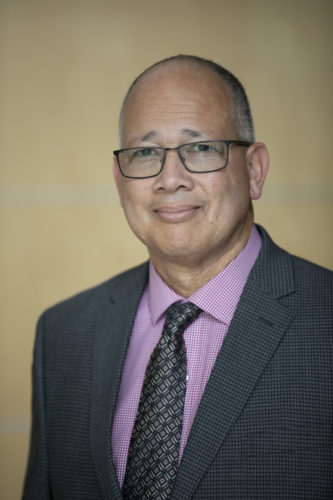Stanford Center for Racial Justice Appoints Executive Director
Stanford Law School (SLS) has appointed George Brown, an advocate for social and racial justice with three decades of corporate law experience, as Executive Director of the Stanford Center for Racial Justice (SCRJ). Brown will work in collaboration with Ralph Richard Banks, the Jackson Eli Reynolds Professor of Law and the Faculty Director of the SCRJ.

“George’s experience, expertise and advocacy is a unique and valuable foundation for leading our center’s mission to amplify and leverage Stanford University’s policy and academic research and other resources to address the most challenging issues concerning racial equity in America,” said Banks. “George’s leadership will help guide our center toward our goal of confronting racism and its impact by democratizing knowledge, turning ideas into actionable solutions, and leveraging our network of partners to achieve scale and impact.”
“I am honored to accept this important challenge and join Stanford to help pursue solutions to the current problems produced by our country’s long history of racial injustice,” said Brown. “The establishment of the Stanford Center for Racial Justice reflects the university’s recognition that racism in America has caused pervasive disparities among groups and also diminished opportunities for people of all races. Together, we can help our society be fairer and more equitable, and work better for the benefit of everyone.”
The SCRJ was founded in 2020 by Banks and Diane T. Chin, Associate Dean for Public Service and Public Interest Law, and aims to become the preeminent academic venue for producing and disseminating research and developing leaders to address some of the most entrenched racial inequities in American society. SCRJ will collaborate with scholars across Stanford and with grassroots nonprofits, government agencies and corporations. It will leverage the intellectual capital, research capabilities and stature of Stanford University to develop initiatives that identify and address some of the most daunting race-related challenges in American society.
“The creation of the center is a remarkable commitment by the university and the law school to address the continuing impact of racism that was institutionalized at our nation’s founding,” said Chin. “I am proud of the research and policy work we accomplished in our first year, but know that with George Brown’s leadership and vision, the center will only achieve greater impact across a multitude of sectors.”
Brown has an MBA and law degree from UCLA. Throughout his business career as a litigator and expert in security class actions and corporate governance, Brown has also advocated for social justice. Among many other involvements, he led precedent-setting voting rights litigation under the California Voting Rights Act, served as board co-chair of the Lawyers’ Committee for Civil Rights of the San Francisco Bay Area, and served as voting rights counsel for California’s inaugural Citizens Redistricting Commission in 2011.
During the past half-decade, Brown has turned his advocacy efforts to police reform. He was a co-creator of New Era of Public Safety: A Guide to Fair, Safe and Equitable Community Policing (Leadership Conference March 2019) and co-led a large-scale pro bono effort that led to its publication. He has been active in police reform activities in Santa Monica, California, participating in community activism during 2020 that led to the creation of a Public Safety Reform and Oversight Commission, which he now Chairs.
Brown has also served in leadership roles on several non-profit boards in the area of youth services, juvenile justice, affordable housing, and more. He designed, created and operationalized the Boys & Girls Clubs of Metro Los Angeles and served as its first board chair. Brown was vice chair of the board for Fresh Lifelines for Youth, a juvenile justice organization founded by an SLS alum. He was chair of the board of Housing Trust Silicon Valley and chaired the Audit Committee of Silicon Valley Community Foundation. He currently serves on the governing board of the Children’s Hospital Los Angeles.
Brown also taught at UCLA law school and has been an adjunct professor at UC Berkeley Law School.
Get the latest from the Stanford Center for Racial Justice
About Stanford Law School
Stanford Law School is one of the nation’s leading institutions for legal scholarship and education. Its alumni are among the most influential decision makers in law, politics, business, and high technology. Faculty members argue before the Supreme Court, testify before Congress, produce outstanding legal scholarship and empirical analysis, and contribute regularly to the nation’s press as legal and policy experts. Stanford Law School has established a model for legal education that provides rigorous interdisciplinary training, hands-on experience, global perspective and focus on public service, spearheading a movement for change.
